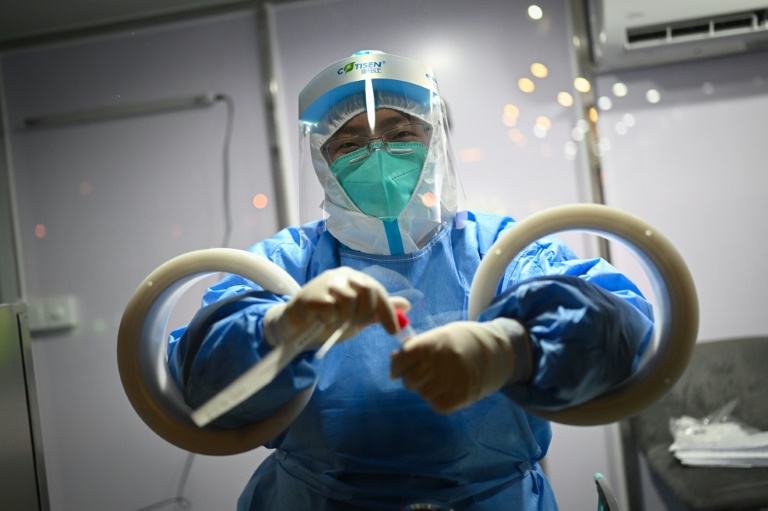Science
COVID-19 Cases Surge in the U.S. Amid New Variants and Challenges

COVID-19 cases are increasing across the United States, according to the latest data from the Centers for Disease Control and Prevention (CDC). This rise is being linked to new variants, particularly the NB.1.8.1 variant, known as Nimbus. Identified in March 2025, Nimbus is reported to cause severe symptoms, including a sharp sore throat, and has rapidly spread to approximately 25 states.
As the nation faces the potential for a summer wave of infections, complications arise from recent vaccine restrictions implemented by the administration of former President Donald Trump. This situation is exacerbated by the influence of figures such as Robert F. Kennedy Jr., who has a history of promoting misinformation regarding health issues.
Understanding the Current COVID-19 Landscape
The summer months often see a spike in COVID-19 cases in the U.S., influenced by factors such as rising temperatures, social behaviors, and the virus’s ability to mutate. The current prominent variants include NB.1.8.1, along with XFG and LP.8.1, both of which are derived from earlier Omicron strains. While many individuals with healthy immune systems may experience mild cases, the phenomenon of long COVID continues to affect patients, leading to long-term symptoms such as fatigue and cognitive difficulties.
The situation prompted an analysis by Dr. Tyler B. Evans, a leading expert in infectious disease and public health. Dr. Evans served as the first Chief Medical Officer for New York City during the initial COVID-19 surge in 2020 and has extensive experience managing disease outbreaks globally. His insights highlight the critical nature of the current wave, particularly as the effective reproduction number (Rt) indicates rising transmission rates.
Dr. Evans noted, “COVID-19 activity is clearly on the rise again, as seen in CDC’s Rt estimates. This increase is likely due to a combination of waning immunity, indoor congregation, and the natural evolution of the virus.”
Preparing for Potential Infections
With the Rt number trending above 1, indicating that each infected person is causing more than one new infection, Dr. Evans emphasized the need for preparedness rather than panic. He stated, “While we’re in a much better place than in 2020, rising transmission still poses a risk to those with underlying conditions or limited access to care.”
Local health authorities must focus on protecting vulnerable populations and enhance communication efforts around testing and vaccination. Dr. Evans cautioned against complacency, stating that “Rt values hovering around 1 don’t necessarily mean transmission is stable,” suggesting the need for continuous monitoring and local surveillance, especially in underserved communities.
As the U.S. navigates this new phase of the pandemic, discussions surrounding updated vaccines to target emerging variants are becoming increasingly urgent. Dr. Evans stressed that access and public confidence in vaccines are vital components of any response strategy. “A more effective vaccine won’t help if the people who need it most can’t get to it or don’t trust it,” he remarked.
Dr. Evans advocates for community-level strategies, particularly in areas hardest hit by the pandemic, to ensure effective vaccine rollouts. He added, “Mitigation should match the moment. While broad mandates may not be necessary right now, we shouldn’t shy away from common-sense measures in higher-risk settings.”
The current situation serves as a reminder of the ongoing challenges posed by COVID-19, highlighting the importance of vigilance, preparedness, and community engagement as the nation faces a new chapter in its battle against the virus.
-

 Politics4 weeks ago
Politics4 weeks agoSecwepemc First Nation Seeks Aboriginal Title Over Kamloops Area
-

 World5 months ago
World5 months agoScientists Unearth Ancient Antarctic Ice to Unlock Climate Secrets
-

 Entertainment5 months ago
Entertainment5 months agoTrump and McCormick to Announce $70 Billion Energy Investments
-

 Science5 months ago
Science5 months agoFour Astronauts Return to Earth After International Space Station Mission
-

 Lifestyle5 months ago
Lifestyle5 months agoTransLink Launches Food Truck Program to Boost Revenue in Vancouver
-

 Technology3 months ago
Technology3 months agoApple Notes Enhances Functionality with Markdown Support in macOS 26
-

 Lifestyle3 months ago
Lifestyle3 months agoManitoba’s Burger Champion Shines Again Amid Dining Innovations
-

 Top Stories2 months ago
Top Stories2 months agoUrgent Update: Fatal Crash on Highway 99 Claims Life of Pitt Meadows Man
-

 Politics4 months ago
Politics4 months agoUkrainian Tennis Star Elina Svitolina Faces Death Threats Online
-

 Sports5 months ago
Sports5 months agoSearch Underway for Missing Hunter Amid Hokkaido Bear Emergency
-

 Politics5 months ago
Politics5 months agoCarney Engages First Nations Leaders at Development Law Summit
-

 Technology5 months ago
Technology5 months agoFrosthaven Launches Early Access on July 31, 2025





















